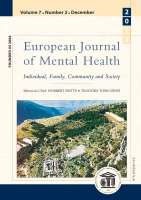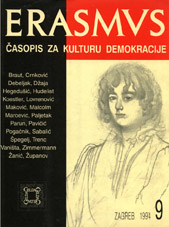






Keywords: psychotherapy; Rumania; communism; state socialism; dictatorship; history; retrospect; helping profession; Ceauşescu; contextual therapy
The paper tries to provide a history of psychotherapy in Rumania during the socialist dictatorship of Nicolae Ceauşescu (1965–1989). In order to fully understand the peculiarities of the development of psychotherapy in the last decades of the previous century, it is absolutely necessary to take into consideration the deep degradation of the quality of interpersonal relations in Rumania and to analyze the causes that have determined this process. Rumania is the only country in Eastern Europe having as leaders, for 45 years continuously, two Stalinists, both of them with identical political formation, who are remembered for intense ideological activity, misguided zeal and constancy, both becoming dreaded and indisputable leaders, setting up a national-communist dictatorship – Gheorghe Gheorghiu-Dej, and a personal one – Nicolae Ceauşescu. Under these circumstances, beginning with 1945, the recently founded Rumanian Society for Psychopathology and Psychotherapy disrupted its activity, due to the schisms between members. The Rumanian Academy was abolished, and a new one was set up. One by one, the Popular Rumanian Academy contested Freudism, psychosomatic medicine, and behaviourism. Without being formally forbidden, psychotherapy was incompatible with the primitive Marxism of the era, and this general state of things lasted for quite a long period. The paper presents the efforts of specialists after the 60s, when more papers and books were published that described various types of psychotherapies, familiarising the professionals with the fundamental ideas in psychotherapy; there were also psych iatrists and psychologists with initiatives in the fi eld and the main textbooks published in this period described psychotherapeutic methods. Unfortunately, little attention was paid to psychoanalysis, cognitive therapies, group therapies, family therapies, and psychodrama. Without openly suppressing the practice of psychotherapy, the offi cials responsible for the health system did not encourage the ones with such initiatives at all, and the academic bodies, with few exceptions, were hostile to various forms of psychotherapy with an emphasis on those of psychoanalytic origin, for which they had cultivated old reflexes of rejection. This state of things explains the amplitude and the vigour of the initiatives breaking out after 1989, accomplishing the modalities for a structured and complete training.
More...
Keywords: Poland; pastoral counselling; Communism; history; retrospection; political change; theology; universities
Pastoral counselling has long been widely acknowledged as a basic notion in pastoral theology. Besides caritas and revelation, it is also one of the essential issues in Church. Pastoral counselling became especially relevant during the oppression of Churches in totalitarian regimes, as in Poland after World War II. Communist authorities showed hostility towards the Church; therefore, the establishment of the Communist rule severely affected both the activity of the Polish Church and pastoral counselling. As a result, the pastoral counselling activity of the Church in Communist Poland was confined to the sacristies, so to say. This mode of Church existence was the only tolerated way of answering the spiritual needs of religious citizens but it led to a minimalistic interpretation of pastoral counselling in many places. Communism cast its shadow over the counselling activity, which struggled with a lot of difficulties, especially when it was carried out in the army or prisons. This situation forced the Church to develop new forms of pastoral work in the totalitarian regime. Since freedom was regained, the Church has been facing new challenges, which are not easy to overcome. The present era calls for a paradigmatic change in the Church and the transformation of the Communist-time ‘ecclesia militans’ into an ‘ecclesia serviens’ rooted in a free society. The Church has to reconsider its mission and carry out a kind of ‘aggiornamento’. In this new situation, pastoration has to go through a reform as well. In post-Communist societies this transformation and pastoration could felicitously be called the ‘post-socialist imitation of Christ’. The situation in which the Polish Catholic Church has been living after the political change presumes the renewal process termed ‘new evangelisation’ by Pope John Paul II. With regard to the change in social order, the Church is facing the challenge of establishing a new working style of pastoration. In order to avoid the fragmentation of pastoral work into several individual concepts of spiritual counselling, it has to be closely linked to theology. This is why pastoration has turned to modern humanities and social sciences and has been involved in critical dialogue with these disciplines as part of the responsible counselling work of the Church. Pastoral theology in Poland has a lot to catch up with in this respect. The atheist state thwarted all Church attempts to provide theological education to laypersons. In Communist times the Polish Catholic Church was allowed to run one university only (KUL), which was also the only Catholic university in the whole Eastern bloc. In the meantime, the theological landscape has been transformed. After the political change the Church could take the opportunity to create better theological education for laymen as well. It succeeded in taking over one of the universities in Warsaw (UKSW) and founding several theological faculties that have also been recognised by the state.
More...

Keywords: teachers; stress; mental fatigue; Job Demands-Resources model; health
In recent years, many studies have focused on the determinants and consequences of teacher stress. One of the most recent theoretical models concerning stress is the Job Demands-Resources (JD-R) model. This study examines one process – namely the energetic process – which supposes that high job demands exhaust employees’ mental and physical resources and therefore cause ill health. Particularly, this study examines the mediating role of mental fatigue between three job demands of teachers (workload, inequity and work/family conflict) and three consequences of stress: psychological and physical symptoms and work satisfaction. An Italian version of the Self-report Questionnaire for Psychosocial Work Environment and Stress (PWSQ) was administered to 697 teachers belonging to a random sample of 17 school organisations. The results showed that mental fatigue has a mediating role in the relationship between work/family conflict and the three outcomes considered, namely psychological and physical symptoms, and work satisfaction. This study has an important implication for intervention strategy because mental fatigue is a pre-strain condition which arises before more intense outcomes, such as stress-related diseases occur. Identification of this condition allows prevention of the consequences of stress.
More...


Sead Čamo - I ONDA ... IMAMO LI PRIČU? Ozren Kebo - SARAJEVO ZA POČETNIKE Valentin Kreševljak - KRISTOV ZNAK Semezdin Medmedinović - KOMPOZITOR NN (Koksara) - ARAPI ŠALJU POMOĆ Marko Vešović - JE LI ISLAM IŠTA PORASTAO? Marko Vešović - TRI ČUDA
More...

U ovom broju našeg časopisa gostuje Luko Paljetak: na poziv našeg uredništva napisao je Dubrovački mozaik, devet literarnih impresija i asocijacija iz Dubrovnika ranjenog ratom, te esej Gospoja svijeh gospoja - Cvijeta Zuzorić, kao popratni tekst uz njegovu pjesmu Gospođi Cvijeti. U dogovoru s autorom dodali smo još neobjavljenu prozu Lijepljenje papige i znameniti četrdeset i treći sonet Elizabeth Barrett Browningiz ciklusa Portugalski soneti, što ga je Paljetak upravo preveo i priprema ga za tisak. Uz autorovu suglasnost, uredništvo je izvršilo izbor pjesama iz zbirki Ubežne pesmi Izbjegle pjesme, Pjesni na dubrovačku, Na rubu tijela i Miševi i mačke naglavačke, koje uz osvrte Zvonka Makovića i Tonka Maroevića barpribližno dočaravaju svestranost u stvaralačkom bogatstvu Erasmusova gosta.
More...

Među mnogim uzbudljivim knjigama Arthura Koestlera knjiga Janus. iz koje preIlosimo uvodno poglavlje. Vjerojatno je najdramatičnija: grčeviti pokušaj sinteze (ili sume) svih intimnih, novinarskih, literarnih, političkih, znanstvenih i filozofskih traženja na životnom putu jedne od najsvestranijih i najplodnijih autorskih ličnosti dvadesetog stoljeća. Rođen 1905. godine u Budimpešti, studirao je egzaktne znanosti i psihologiju u Beču, bio je urednik znanstvene biblioteke izdavača Ulstein u Berlinu, dopisnik vodećih evropskih listova s Bliskog istoka i iz španjolskog građanskog rata, pa zatočenik kod Franca i bjegunac, vojnik francuske Legije stranaca, pa opet bjegunac, dobrovoljac u britanskoj vojsci za vrijeme Drugog svjetskog rata te, napokon, britanski akademik, počasni doktor uglednih univerziteta, nosilac visokih literarnih nagrada, organizator najelitnijih simpozija, pokretač znamenitih literarnih, znanstvenih i političkih inicijativa. Napisao je šest romana (najpoznatiji Darkness at Noon, 1940., kod nas preveden 1975. pod naslovom Tama u podne), pet memoarsko-autobiografskih knjiga i 22 knjige literarnih, političkih i znanstvenih radova i eseja. U ranoj mladosti bio je cionist, komunist od 1931. do 1938. godine, kad je zbog moskovskih procesa raskrstio s komunizmom i idućih 20 godina posvetio publicističkom, literarnom i aktivističkom obračunu s tom ideologijom i praksom. Zatim se opet vratio znanosti i posebno se posvetio istraživanju podudarnosti i razlika između umjetničke i znanstvene kreativnosti (knjige The Act of Creation i The Ghost in the Machine). Na samom početku knjige Janus napisao je (1977. godine): "Ova je knjiga sumiranje (ili nastavak) djela što sam ih objavljivao u posljednjih dvadesetak godina, otkad sam se poslije mojih političkih romana i eseja posvetio znanosti o životu, to jest evoluciji, kreativnosti i patologiji ljudske psihe... " Ustanovivši da je obolio od leukemije, okončao je život samoubojstvom 1983. godine.
More...


Poslije Hamleta u Paljetkovu i Shakespeareovu kontekstu
More...
General Špegelj već četiri godine uživa reputaciju tvrdog Jastreba" na hrvatskoj političkoj sceni, iako su njegovi istupi samo uvjetno ratoborni. Zastupnik je ideje da su za Hrvatsku nepovoljni pregovori s agresorom iz pozicija vojno slabije strane i da samo ravnoteža vojne prijetnje, koja može i ne mora biti upotrijebljena, dovodi do pravednog mira. Rat za zapadnu Bosnu u studenom 1994., koji je u hrvatskoj, bosanskoj i svjetskoj javnosti izazvao brojne još nerazriješene vojne i političke dileme, ponovno je skrenuo pažnju prema koncepcijama koje najeksplicitnije zastupa general Špegelj, kombinirajući pri tome vojno-strateški, geopolitički i politički pristup. U četvrtom broju našega časopisa, u okviru tematske cjeline "Rat ili mir u Hrvatskoj?", general Špegelj je s trojicom sugovornika već iznio dijelove svojih koncepcija, a sada smo ga zamolili da ih detaljnije razradi i argumentira s posebnim osvrtom na aktualno krizno čvorište u zapadnoj Bosni. Istovremeno, objasnio je i neke nejasnoće oko famoznog filma iz siječnja 1991. godine i oko nerealiziranih prijedloga da bude postavljen za zapovjednika vojske BiH.
More...